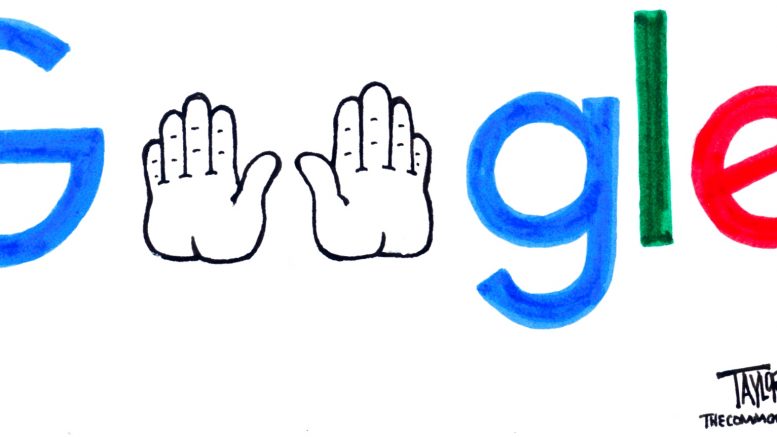
By Jake Anderson
AntiMedia (4/9/18)
(ANTIMEDIA) — With all the attention paid to Facebook in recent weeks over ‘data breaches’ and privacy violations (even though what happened with Cambridge Analytica is part of their standard business model), it’s easy to forget that there are four other Big Tech corporations collecting just as much — if not more — of our personal info. Google, Amazon, Apple, and Microsoft are all central players in “surveillance capitalism” and prey on our data. New reports suggest that Google may actually harvest ten times as much as Facebook.
Curious about just how much of his data Google had, web developer Dylan Curran says he downloaded his Google data file, which is offered by the company in a hub called “My Account.” This hub was created in 2015, along with a tool called “My Activity.” The report issued is similar to the one Facebook delivers to its users upon request. Whether or not these reports are comprehensive is still up in the air, but Curran says his was 5.5 GB, which is almost ten times larger than the one Facebook offered him. The amount and type of data in his file, Mr. Curran says, suggests Google is not only constantly tracking our online movements but may also be monitoring our physical locations.
Curran’s Google report contained an incredible amount documentation on his web activity, going back over a decade. But perhaps more importantly, Google had also been tracking his real-life movements via his smartphone device or tablet. This included fairly random places he’d frequented, many of the foreign countries and cities he visited, the bars and restaurants he went to while in these countries, the amount of time he spent there, and even the path he took to get there and back.
This, of course, is not new. It has been well-known for some time that Google silently tracks you everywhere you go and creates a map of your physical movements through its Location History feature. You can deactivate it by going to your timeline and adjusting the preferences.
Another Google user downloaded his file and discovered the company had been archiving his data even when he browsed in Incognito mode, a setting that advertises itself as one that does not save browsing history.
You are up for sale
Like Facebook, Google gathers your info for sale to 3rd-party advertisers, including your name, email address, telephone number, credit card, specific ways you use Google’s services, your mode of interaction with any website that uses Google technology (such as AdWords), your device, and your search queries. And if you don’t enter your account and make adjustments, pretty much anything you do online while deploying a Google tool is tracked. Google’s policy states:
“If other users already have your email, or other information that identifies you, we may show them your publicly visible Google Profile information, such as your name and photo.”
But much of the location data stems from the use of Google apps like Maps or Now, which broadcast your location. If you want to stop this information from being shared, you have to go into your account settings and make adjustments.
The ostensible purpose of this data-sharing is to fine-tune your user experience, but who is benefitting more is arguable. The same year it released its new activity hub, Google also unveiled a new program that shares your email with high-value advertisers. Called Customer Match, this system streamlines consumer info so that an advertiser’s “brand is right there, with the right message, at the moment your customer is most receptive.”
Google’s policy also lists the three major categories of data collection: Things you do; Things you create; and Things that make you “you.”
But you do have the ability to limit this info from getting out. You can turn off location tracking, voice searches, and other features; you can view and edit your preferences; you can adjust your public profile, and you can download Google’s data hoard to see what they see.
You’re also welcome to go a bit further and delete all of your data from not only Google but also a variety of other online services.
- Go to Deseat.me and sign in with a Gmail address.
- Look down the list of synced accounts and decide which you want to delete and which you want to keep.
- Click the button
Will deleting a select amount of your data from the innards of the Big 5 stop predatory data mining? Certainly not. But while Facebook testifies before Congress, we have an opportunity to draw attention to some of the consequences of a technocracy that privatizes surveillance. As the control grid tightens, our reaction indicates our level of complacency.
(Creative Commons / Anti-Media )
(Commoner Call cartoon by Mark L. Taylor, 2017. Open source for non-derivative use with link to www.thecommonercall.org )
*****
Cambridge Analytica May Also Have Accessed Your Private Facebook Messages
By Issie Lapowsky
WIRED (4/10/18)
THE DATA CONSULTING firm Cambridge Analytica, which harvested as many as 87 million Facebook users’ personal data, also could have accessed the private inbox messages of some of those affected. Facebook slipped this previously undisclosed detail into the notifications that began appearing at the top of News Feeds on Monday. These alerts let users know whether they or their friends had downloaded a personality quiz app called This Is Your Digital Life, which would have caused their data to be collected and potentially passed on to Cambridge Analytica.
While Zuckerberg and the company he runs have rushed to cast themselves as transparent in the wake of a massive data privacy scandal, the company has consistently slid ever more troubling information.
Facebook buried the disclosure in the details about what information was compromised: “A small number of people who logged into ‘This Is Your Digital Life’ also shared their own News Feed, timeline, posts and messages which may have included posts and messages from you.”
A Facebook spokesperson confirmed that the app, which was designed by Cambridge University researcher Aleksandr Kogan to collect data on Americans on behalf of Cambridge Analytica’s British counterpart SCL, requested access to user inboxes through the read_mailbox permission. Unlike the collection of specific user friend information, which Facebook says it phased out in April 2015 unless both people had downloaded the same app, the read_mailbox permission didn’t fully deprecate until that October. …

